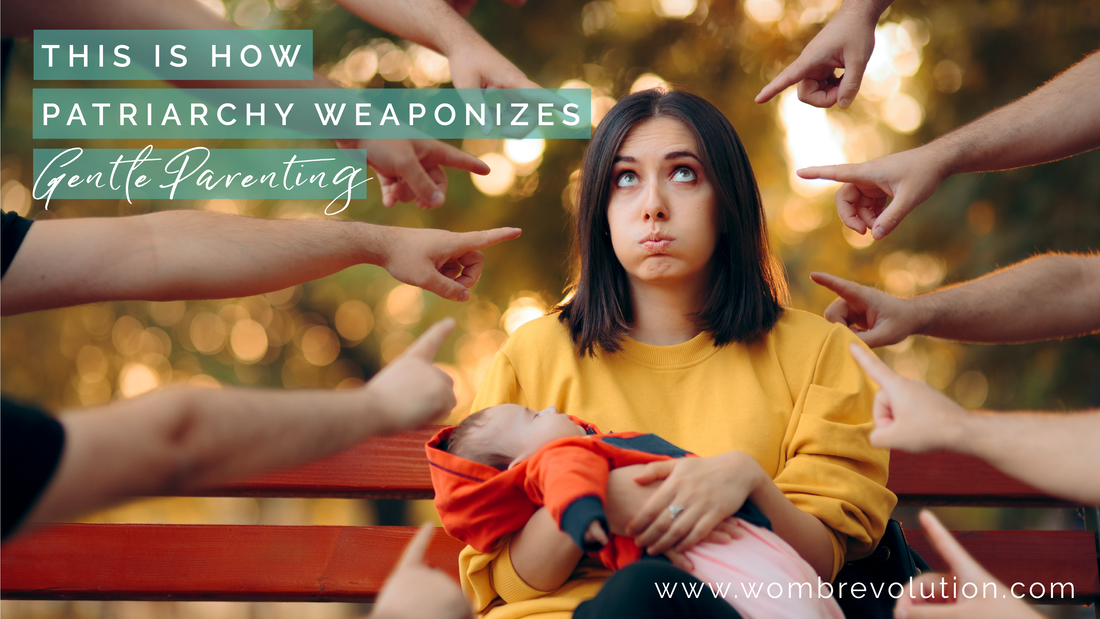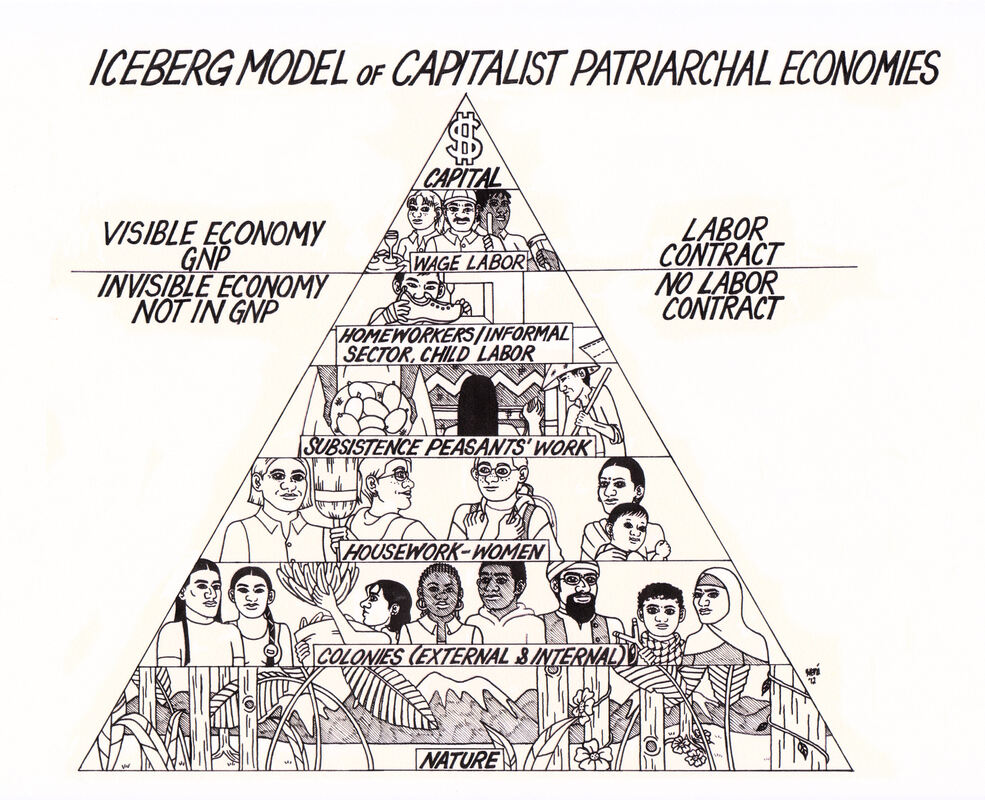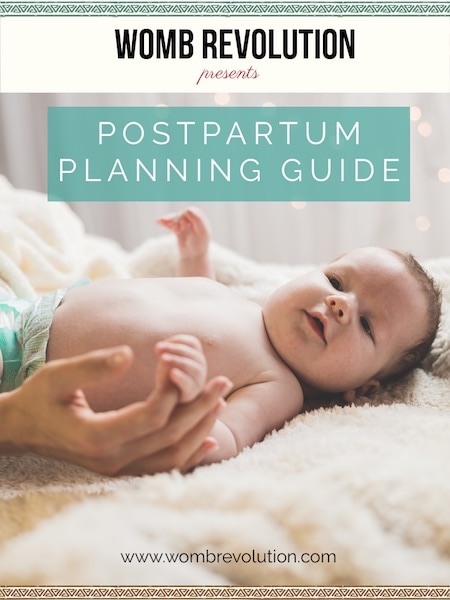As a birth worker, I’m constantly exposed to the shocking contrast between the special care and accommodations society facilitates for pregnant people and the harsh judgment that mothers face once their babies are born.
A visibly pregnant person might have someone offer them a seat on the bus, be helped to carry groceries, or be gifted cute clothes and diaper cakes for her unborn child. Meanwhile, the newly postpartum mom is mostly rushed to lose weight, care for her child 24/7, and get back to the productivity race that keeps capitalism running. “Sounds too hard? Well, you wanted to have children, right?”
In the past few years, highlighted by the COVID-19 pandemic, the awareness about mother’s declining mental health has grown. In truth, Western culture has been equating motherhood (and especially postpartum) with depression, noble suffering, and rewarding sacrifice for centuries. Nowadays the internet has given many people platforms to express themselves openly and hear from others, and the reality is clearer than ever: moms, for the most part, are not okay.
Struggling, broken, rageful, resentful, desperate, suffocating, alone, trapped, lost: these are some of the most common words moms in social media safe spaces will use to describe their daily lives if given the chance to share anonymously or privately.
According to CDC research, 1 in 8 birthing people may experience postpartum depression in the year after giving birth. With approximately 4 million live births occurring annually in the United States, this means around 500,000 postpartum depression diagnoses.
The prevalence of postpartum mood disorders is not a secret, but it’s gravely misunderstood. Most people dismiss it as a hormonal shift that will eventually pass and assume that after that initial encounter with the baby blues, motherhood will become the most joyful and rewarding experience in a woman’s life: The happily ever after.
Many think that when it comes to honesty and expressing grievances about motherhood, the pendulum has swung too far. Articles such as How Millenials Learn to Dread Motherhood illustrate this point and I think behind it, there is a yearning. Ever since early childhood those of us who are socialized to fulfill feminine roles in society are groomed into heterosexual myths of happiness through the nuclear family. Princess culture, abstinence-only sexual education, hyper-sexualized feminine idols, and the extremely demanding ideal of the super mom who “has it all”, are some of the overwhelming contradictions that plague the landscape of growing up female in the Western world.
It can be very confusing to become a mother: a role that covertly and overtly has been presented as the most important role we can fulfill as women or people expected to perform femininity. We are bombarded with many options and “choices”: fictional and real. Everything from choosing a prenatal provider to the right brand of car seat feels loaded. Behind this idea there is an unquestioned notion that mothers are to blame for making the wrong choices: if you end up in an abusive relationship, you didn’t choose your partner well; if you experience obstetric violence, you should have gone to a birth center; if your child is struggling, you are parenting wrong.
Of course, it’s not all bad. We love our children fiercely and the good moments can feel for many like they truly make up for everything else, and for some people, they do. But it’s in this place that our love can easily be weaponized against us and against the kind of change that we need at a societal level. For a society that runs on unpaid and overpaid feminized labor, love is an important currency.
And even though the phrase “it takes a village” gets parroted at us often, mostly to try to get us to buy some app or product, there is also an insidious implication that we are meant to be able to do everything by ourselves. After all, many women before us did it with no help and they didn’t complain.
Without support, paralyzed by guilt and shame, underpaid and overworked, and carrying the bulk of the responsibility of care and housework, it’s not a huge surprise to know most moms are not okay.
| "Without support, paralyzed by guilt and shame, underpaid and overworked, and carrying the bulk of the responsibility of care and housework, it’s not a huge surprise to know most moms are not okay." |
GENTLE PARENTING AND PATRIARCHY
In light of the current crisis and perpetual burnout mothers are facing, many turn to the experts. If motherhood is what feels hard, it makes sense to turn to parenting gurus. As mothers, we want to enjoy our children and family life, we want to enjoy motherhood, we want that relationship to feel fulfilling. After all, this is the happily ever after we were promised in fairy tales, and if it’s not making us happy, we assume the problem is… us.
Unfortunately, the field of “parenting experts” is not an exception to the overbearing shadow of patriarchy. Even though most of the responsibilities associated with parenting are performed by people socialized as female (especially women of color), most authors of parenting books are male (and white). If we look at the history of parenting advice in the last century, we will see figures such as behaviorist John Watson. Watson claimed to be able to shape any child into anything through cruel conditioning and control, and his legacy unfortunately persists. This is the guy who popularized cry-it-out method and the reason why there are still many people in the school systems who think children can be trained like dogs to behave or perform compliance.
With the development of neuroscience and the deeper understanding it provides us about children’s growing brains, many experts have walked away from behaviorist methods and embraced the powerful tools and perspectives that are now commonly known as “gentle parenting”, “peaceful parenting” or “respectful parenting.” This is a great improvement.
Gentle parenting has many definitions and applications, but overall it describes a parenting approach focused on empathy, collaboration, connection, and setting kind but firm limits with the young people in our lives. It’s a really beautiful approach that, if embraced fully, has the potential to undo systems of oppression within family units.
But it’s not hard to see how the image and wording “gentle parenting” evoke sanitized, homogenized, romanticized ideas about family that play into the very building blocks of patriarchy and other systems of oppression. It can become another tool to shame and blame mothers, and unfortunately, it often does.
| "Gentle parenting has the potential to undo systems of oppression within family units. But it’s not hard to see how the image and wording 'gentle parenting' evoke sanitized, homogenized, romanticized ideas about family that play into the very building blocks of patriarchy and other systems of oppression. It can become another tool to shame and blame mothers, and unfortunately, it often does." |
I read a couple dozen parenting books in the last few years, all written by authors who fall under the gentle parenting umbrella. I found a lot of incredibly valuable information and tools to navigate parenting and relationships with children, but I had to dig through a lot of sexism, and whiteness in the process.
While some of these authors made their points about loving children unconditionally at the expense of the many mothers they shamed through their observations of public parenting, many others dedicated entire chapters of their books to outdated, gender-essentialist claims that constantly highlight how different women and men are from each other, a phenomenon now knows as neurosexism. As a side note, in her book All the Rage: Mothers, Fathers and the Myth of Equal Partnership, Darcy Lockman highlights the work of neuroscientist Janet Shibley, amongst other scientist who have done extensive research about gender differences and arrived to the conclusion that most of them come from socialization and not biology.
There are many powerful female authors out there, who, like Lockman, are writing about how we can challenge the exploitative nature of moterhood as an institution, and giving voice to feelings such as Mom Rage (Minna Dubin) and being Touched Out (Amanda Montei). But these authors make a firm effort to distance themselves from gentle parenting or any specific parenting approach, and once again the dots are not fully connected.
Back to parenting books, one of my favorite authors included an anecdote that depicted a domestic violence incident witnessed by a teenager but failed to name it as domestic violence. In the end, the story is resolved by the mother using the collaborative problem-solving framework with her son, modeling to her boyfriend how well it works. The boyfriend miraculously has a change of heart and ta-da! The story, as presented in the book, is a picture of success. This passage made my blood chill. As a survivor of Domestic Violence, I know how dangerous the notion of being able to change an abuser is for the women who stay in these situations.
I wish I could say that it’s just a few, mostly male, parenting experts who make excuses for men’s bad behaviors, but unfortunately, that’s not the case. Almost every gentle parenting course and book includes a chapter on what I can only describe as “parenting your husband/partner.” A quick scan through the most popular gentle parenting social media groups will quickly yield tons of posts of desperate mothers who want to parent their children consciously and with respect, and instead of getting their partners' support they get mocked, humiliated, and dismissed.
Parents in the scenario above (but mostly mothers) are constantly invited to offer their partners (mostly men) endless empathy and unconditional love. There is an implied hope that if we model gracefulness and generosity it will eventually be mirrored and we will, finally, get our happily ever after. This attitude illustrates very well what author Jane Ward describes as “the heterosexual repair industry” in her book The Tragedy of Heterosexuality. I understand the good intentions behind this idea. In some cases, it might even work. But putting one more task in the already overly full plate of a burned out mother seems at best, ineffective; at worst, cruel and potentially dangerous. Most of this advice does come with a clear warning: it does not apply to abusive relationships. But no one explains what exactly classifies as abuse.
Overall, I would say that most of the parenting books I have encountered have lots of little nuggets of wisdom I have been able to sift through to bring into my practice as a parenting coach and in my parenting. But they were also very out-of-touch with the daily grind, the ins and outs of hustling your way through life while trying to stay connected to your child in a world that doesn’t value your humanity. These authors seemed unaware of their tacit commitment to structures that cause tremendous harm: the heteronormative nuclear family and stiff binary gender roles, both deeply rooted in the oppressive institutionalization of whiteness and capitalism.
WHAT THE FEMINIST GENTLE PARENTING REVOLUTION WOULD LOOK LIKE
I was trained as a parenting coach in the peaceful parenting framework and the first step to peaceful parenting is self-regulation of the nervous system. However, the nervous system is designed to be activated by dangerous situations. We need safety to stay regulated.
I strongly believe that a good place to start cultivating authentic and lasting joy and safety in parenting is by queering our narratives around family. For this purpose, I invite us to use bell hooks definition of queerness: “Queer' not as being about who you're having sex with (that can be a dimension of it); but 'queer' as being about the self that is at odds with everything around it and that has to invent and create and find a place to speak and to thrive and to live.”
We need to start bravely daring to imagine family outside of the limiting confines of the nuclear family; something that the queer community has been doing for a very long time.
We need to become aware and challenge the pervasive ways in which mainstream indoctrinates us into putting women’s and mother’s needs last.
We need to learn to see the problem as more than an individual struggle where a mom just needs a little self-care and start naming the real culprit: systemic oppression and capitalistic, white supremacist, patriarchal institutions.
We need to hold men and fathers accountable, and stop treating them as children who need to be saved and mothered by their partners.
We need to be willing and able to leave. If a partner refuses to work towards an antipatriarchal family and participate daily in undoing systems of oppression at home, separation is often a way better option than wasting years in an unhappy relationship “for the sake of the children.”
We have to rewrite the old stories about what makes a woman’s life fulfilled. One of the most common sentiments that struggling mothers share is the profound feeling of loneliness and isolation that comes with raising little people in a village-less world. When we disrupt the imposed hierarchy that places romantic love above friendships and other important relationships, our support network grows and gets stronger.
We have to be able to see the whole picture through an intersectional lens that makes space for each individual parent’s circumstances, identities, and needs.
A few years ago, all these ideas would have seemed far-fetched to me, but today I know they are possible. I know it because I’m living them and co-creating them with my beautiful community and chosen family.
I experience the joy of playing on the ground with my friends’ kids, and of holding their newborn babies. I experience the ease of sharing meals with other queers who enthusiastically, without anyone asking and without any expectation of praise start doing dishes after dinner. I experience the comfort of co-regulating with other single parents after a hard day of parenting little humans.
As a single mother, I experience ease, safety, and abundance. I know my children and I are cared for and we lovingly care for others. Some of these conditions undeniably come from privilege, but some others have been crafted bit by bit with late-night conversations about boundaries, cooked in the stove and packed in a Tupperware to feed a newborn family, weaved into the fabric of my relationships.
| "As a single mother, I experience ease, safety, and abundance. I know my children and I are cared for and we lovingly care for others. Some of these conditions undeniably come from privilege; but others have been crafted bit by bit with late-night conversations about boundaries, cooked in the stove and packed in a Tupperware to feed a newborn family, weaved into the fabric of my relationships." |
Let’s do this. Let’s start bringing joy back into our family lives. Let’s do it together.



